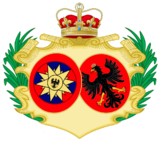Riksting of Paravia
Riksting of Paravia | |
|---|---|
 | |
| Type | |
| Type | |
| Houses | Imperial Council Chamber of Delegates |
| Leadership | |
HIM Emperor Patrick I since 29 November 2014 | |
Ser Stephen Freayth since 9 December 2016 | |
Lise Næsheim-Renwick since 19 February 2016 | |
| Seats | 3 Chancellors (Imperial Council) 11 Delegates (Chamber of Delegates) |
| Elections | |
Last election | None |
The Riksting of the Empire of Paravia is the bicameral legislature of the Empire of Paravia. the Riksting is comprised of two houses, the mostly ceremonial Imperial Council, and the Chamber of Delegates. Members of the Imperial Council are appointed by the emperor to a 6 month term, with the exception of the High Chancellor, whom is elected anually by the citizenry of the Paravian Crown Lands. The Chamber of Delegates consists of 1 delegate from each of the 11 federal states, normally the state leader, and serves an indefinite term.
The Riksting and Chamber of Delegates was established on the 21 July 2016, with the Treaty of Nyros entering into force, reforming Paravia into a federal empire. The Imperial Council was however founded on the 29 November 2014, when Paravia was declared independent.
Powers and duties
The Riksting is the most powerful governmental organ in Paravia. The Riksting passes acts of legislation, which need to receive imperial assent before becoming law. The Chamber of Delegates elects the Riksminister every 4 months, whilst the Imperial Council confirms the Chamber's election. The Riksting derives its power from the crown (emperor) and the Constitution Act of 2016.
Members and structure
In total there 14 members of the Riksting, 3 in the Imperial Council and 11 in the Chamber of Delegates. The Imperial Council consists of 2 chancellors, appointed by the Emperor, and the High Chancellor, elected anually by the citizens of the Paravian Crown Lands. The Emperor has a non-voting seat in the Imperial Council, and usually acts as the speaker. The Chamber of Delegates has 11 delegates, 1 from each federal state. The delegate is usually the leader of the state. The emperor has a voting seat in the Chamber of Delegates as the representative of the Crown Lands.